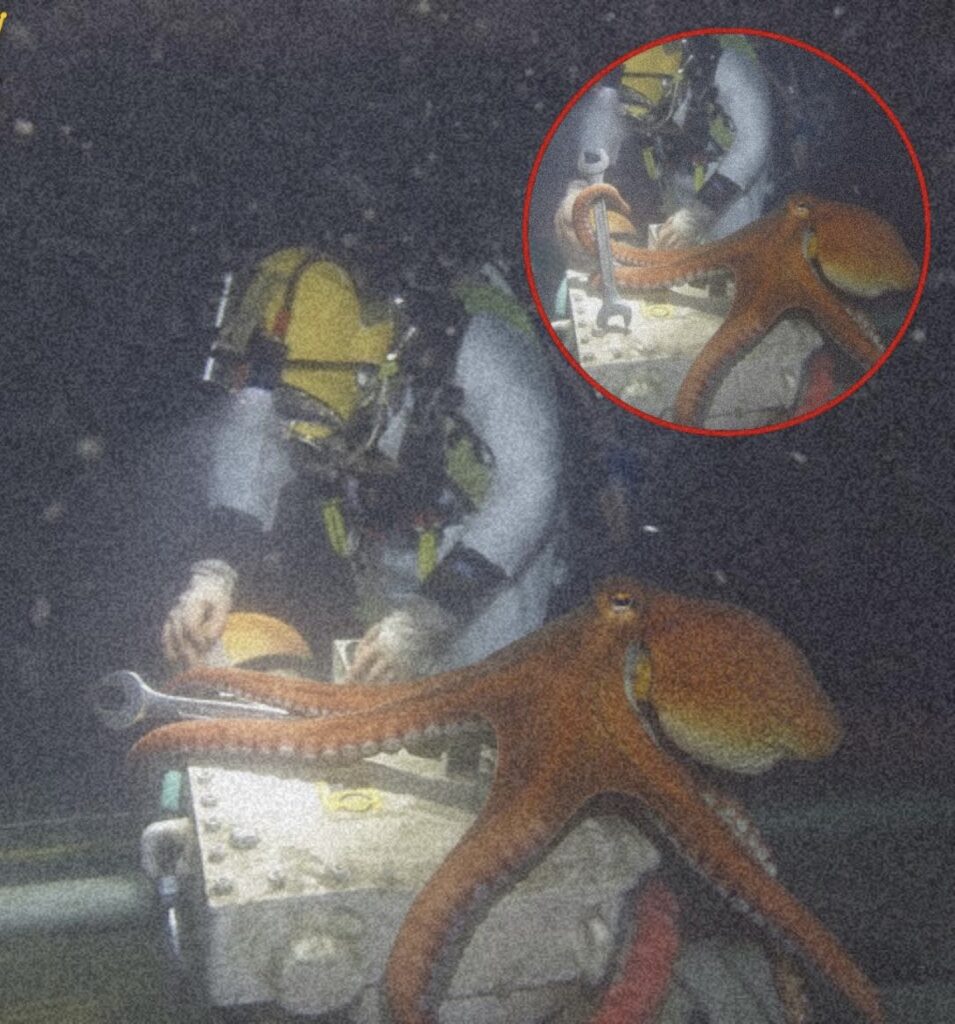It began as an ordinary dive. Off the coast of Portugal, a professional diver descended into the blue to perform routine underwater repairs. His focus was on his work — checking bolts, adjusting fittings, ensuring the equipment held steady against the currents. At first, he barely noticed the shadow moving nearby.
An octopus hovered close, its eight arms curling and unfurling with quiet precision. Encounters like this weren’t unusual. Curious octopuses often observed divers, drifting just close enough to watch before vanishing into the rocks. The diver gave it little thought — until something unexpected happened.
When he reached for a wrench, a tentacle slipped into view, nudging it toward him. Later, when a bolt drifted out of reach, the octopus plucked it from the sand and handed it back. Each time he dropped a tool, the same thing happened: the octopus retrieved it calmly, passing it back with uncanny timing, like a silent assistant from the deep.

At first, the diver laughed it off, unsure if it was coincidence. But the behavior continued dive after dive. The octopus seemed to understand, watching his movements, anticipating what he needed, and responding with surprising accuracy.
When he surfaced and shared the story, no one believed him. Colleagues teased him, saying he had spent too much time underwater. Friends chuckled, insisting octopuses didn’t “help,” they scavenged. The diver, however, knew what he had experienced.
Determined to prove it, he set up cameras on his next dive. The footage captured what words could not. Frame by frame, it showed an octopus moving with purpose, collecting tools, and gently passing them into the diver’s gloved hands. Not snatching, not fleeing — helping.

The video spread quickly online, mesmerizing viewers across the globe. Millions watched as the octopus assisted with quiet diligence, each gesture challenging the way humans view marine life. Was it curiosity? Intelligence? Empathy? Whatever the reason, the result was the same: a diver and an octopus working side by side.
Marine biologists who reviewed the footage were fascinated. Octopuses are known for their intelligence, problem-solving skills, and playful curiosity. Some even use tools in the wild. But to see one engage in what looked like cooperative behavior with a human was something rare. “It’s extraordinary,” one researcher noted. “This suggests a level of observation and adaptability we’re only beginning to understand.”
For the diver, however, the science mattered less than the experience itself. Asked about the encounter, he only smiled. “I’m just happy I had help down there,” he said.

To him, it wasn’t about proving anything. It was about connection — the strange, beautiful moment when two species met not as predator and prey, not as intruder and resident, but as partners in a shared task. In the quiet blue of the ocean, where words could not be spoken, the octopus had chosen action instead.
The story resonated deeply with people around the world. In an era often defined by division, here was a reminder that cooperation transcends boundaries — even species. That kindness can be expressed not only through words, but through gestures. That sometimes, help comes from the most unexpected places.
The octopus has not been seen since, drifting back into the anonymity of the deep. But the footage remains, a testament to one extraordinary encounter between man and sea.
And for the diver, each time he returns to those waters, he can’t help but glance into the shadows, half-hoping to see a familiar shape, eight arms ready to lend a hand once more.